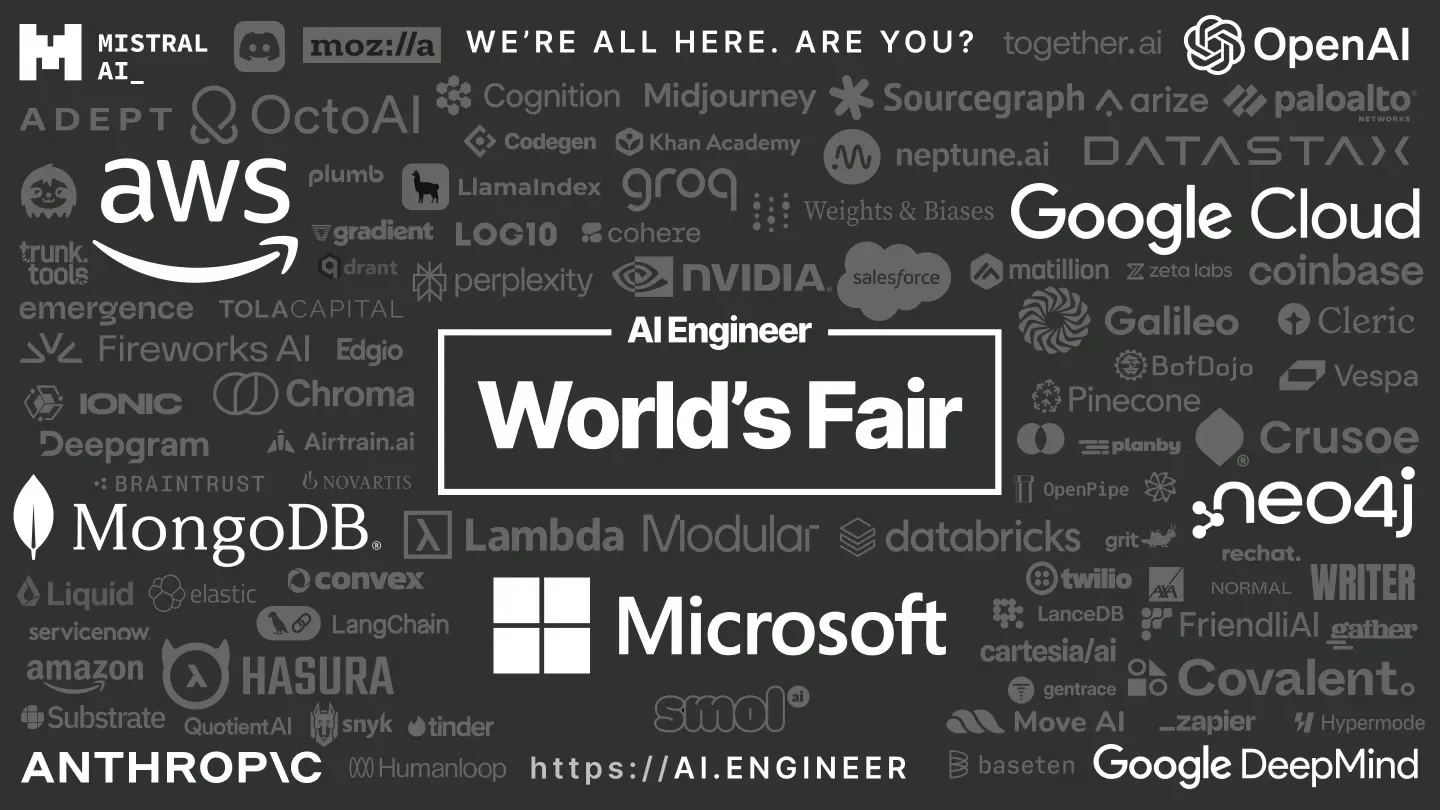← Head back to all of our AI Engineer World's Fair recaps
Open Challenges for AI Engineering
Simon Willison @simonw / Legendary AI Engineer, Independent
Watch it on YouTube | AI.Engineer Talk Details
This talk is about recent developments in AI language models, focusing on how GPT-4 level performance is now available from multiple companies. The speaker discusses challenges in using these models responsibly and the importance of understanding their limitations.
⭐ Llamafile: bringing AI to the masses with fast CPU inference
Justine Tunney @justinetunney / Mozilla
Stephen Hood @stlhood / Mozilla
Watch it on YouTube | AI.Engineer Talk Details
This talk is about Mozilla's open-source project called Llamafile, which aims to make AI more accessible by creating single-file executables that can run AI models on various devices. The speakers discuss how they've improved CPU performance for running AI models locally and explain Mozilla's efforts to support open-source AI projects.
Read our Deep Dive on this talk as well.
Convex Launch
Jamie Turner @jamwt / Convex
Watch it on YouTube | AI.Engineer Talk Details
This talk is about Convex, a company that aims to simplify backend engineering by providing a high-level API. The speaker explains how their platform accidentally became popular for AI applications, and discusses how they're adapting to support AI developers with features like vector indexing and startup programs.
Hasura Launch: Realtime Data Connectivity for AI
Tanmai Gopal @tanmaigo / Hasura
Watch it on YouTube | AI.Engineer Talk Details
This talk is about Hasura's solution for connecting AI models to live data and business logic. The speaker discusses their approach to making data easily accessible to AI, using a unified query language, a simple authorization model, and getting AI to generate its own data retrieval plans.
Read our Deep Dive on this talk as well.
Hypermode Launch
Kevin Van Gundy @kevinvangundy / Hypermode
Watch it on YouTube | AI.Engineer Talk Details
This talk is about Hypermode, a company that aims to make AI development more accessible and less risky for developers. The speaker explains how their platform allows for rapid iteration and easy integration of AI into apps, emphasizing the importance of being able to quickly try different approaches without fear of getting it wrong.
Hyperspace Launch
Varun Mathur @varun_mathur / Hyperspace
Presented by Nicholas Schleffer
Watch it on YouTube | AI.Engineer Talk Details
This talk introduces Hyperspace, a new product from a company that runs a decentralized AI network. The speaker describes their upcoming tool called Hyperspace, which combines prompt engineering, visual node editing, Python execution, and web browsing capabilities to create a powerful AI workflow tool for advanced users.
BotDojo Launch: Enhancing AI Assistants with Evaluations and Synthetic Data
Paul Henry #pauldhenry / Bot Dojo
Watch it on YouTube | AI.Engineer Talk Details
This talk demonstrates BotDojo, an AI enablement platform that helps companies deploy AI applications to production. The speaker shows how their product can be used to create chatbots, generate synthetic data, run evaluations, and improve AI performance through a live demo of their low-code editor and evaluation tools.
Emergence Launch: AI Agents and the future enterprise
Satya Nitta #satya-nitta / Emergence.ai
Watch it on YouTube | AI.Engineer Talk Details
This talk is about a company called Emergence AI and their work on AI agents. The speaker explains how they're building tools to help AI systems work together and do complex tasks, especially for businesses.
Second Order Effects
Cheng Lou @_chenglou / Midjourney
Watch it on YouTube | AI.Engineer Talk Details
This talk explores the concept of second-order effects in AI and technology, using various thought processes to predict future developments. The speaker discusses emergent behaviors, the importance of considering who is learning (humans or machines), widening information bandwidth, and extrapolating quantities to imagine potential future innovations in areas like user interfaces and programming.
Spreadsheets-are-all-you-need: Decoding the Decoder LLM without de code
Ishan Anand @ianand / Independent
Watch it on YouTube | AI.Engineer Talk Details
This talk provides a detailed explanation of how GPT-2, an early language model, works by implementing it entirely in an Excel spreadsheet. The speaker walks through the model's anatomy, demonstrates how it processes information, and shows how to manipulate its behavior, all to help AI engineers better understand the inner workings of large language models.
The Future of Knowledge Assistants
Jerry Liu @jerryjliu0 / Llamaindex
Watch it on YouTube | AI.Engineer Talk Details
This talk by Jerry from LlamaIndex discusses the evolution of knowledge assistance systems, moving from basic RAG (Retrieval-Augmented Generation) to more advanced single-agent and multi-agent systems. He introduces new features and tools from LlamaIndex, including improved data processing, agentic RAG, and a new framework called LlamaAgents that represents AI agents as microservices for better scalability and production deployment.
AI Engineering Without Borders
Swyx @swyx / Latent.Space / Smol
Watch it on YouTube | AI.Engineer Talk Details
This talk by Swyx explores the evolving concept of AI engineering, challenging traditional boundaries and definitions in the field. He encourages AI engineers to think beyond conventional borders, consider the fundamental laws and trends of AI, and focus on utility while engaging in productive disagreement to advance the field.
Pinecone Launch: Pinecone Assistant
Jocelyn Matthews #jocelyn-z-matthews / Pinecone
Watch it on YouTube
This talk introduces Pinecone Assistant, a new beta API service from Pinecone that allows developers to build AI assistants that can accurately answer questions about private data. The speaker highlights the service's simplicity, data protection features, and performance advantages, encouraging developers to try it out and provide feedback during the beta period.
